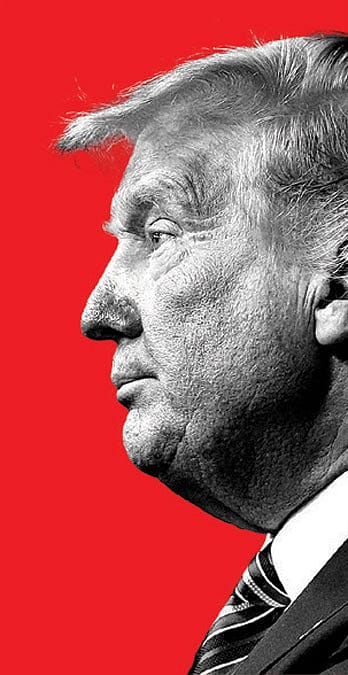We the People (Contd.)

IT IS AS IF, LATELY, American legends descend from the high towers of capitalism or rise from the lower terrains of resentment. The contrasts in the plot are as compelling as the sameness in theme. Today, they are set in New York.
First, the man who was for so long an anti-hero of the tabloids. When he stepped out of the gilded castle into the midst of middle America’s shirtless, he was the unlikely outsider tapping into the anger of a class he knew till then only as an abstraction. He sold them an America unapologetic about its power but not worthy of its traditional parties, protected from the culture-corroding aliens and indulgent towards the flag-waving greatness junkies.
It took an elite to lead the war on elitism, political as well as cultural. Without the trappings of a sophisticate or the vocabulary of a prophet, he was a colossal anti-intellectual in love with his own ‘smartness’, which, he believed, could make America great and the world peaceful again. Social conservative, autocrat of the marketplace, evangelist of America First, an apostle of individual instincts over institutional norms, he found wicked pleasure in driving liberals to hysteria. Governance was a redeemer-rogue’s permanent war on the Establishment.
The legend of Donald Trump needs an antithesis, and even a miniature version will do.
Openomics 2026: Continuity and Conviction
06 Feb 2026 - Vol 04 | Issue 57
The performance state at its peak
New York, I’m here, and I won’t apologise for being young and Muslim—that was the realisation of an idea so far confined to the streets and campuses, resisting the war on Hamas and endorsing the struggle for Palestine. I’m a Democratic Socialist, all for the humanised version of a Soviet cosmopolis where the oligarchy will give way to the power of the proletariat, punished by the cost of healthcare and housing—that was the spirit of the man who was made possible by the urban anti-Trumpism fuelling the revolutionary romance of a generation. The new idyll-breaker was perfected in the laboratory of progressivism, where everything that Trump ridiculed as anti-Americanism—from wokeism to communism—added to the aura of the storm rider.
He was a representational figure. His replicants multiplied in the newly paved liberation streets of the West, where authority was sloganised as tyranny, and silence as complicity. The struggle itself was power, and to be young was, to paraphrase Wordsworth, very heaven. This New York rebel too updated his political space on the left to suit the generational rage against power-as-usual. From a certain angle, he looked like an undergraduate from the school of Obama circa 2008, echoing yes-we-can without the poetic flourish or promising tomorrow without an oracular drawl. It was cool to be a socialist again, certainly when revolution was a privilege.
The legend of Zohran Mamdani, the next mayor of New York, was inevitable as the insurrection led by the flawed liberator unravelled itself.
Both bring out the possibilities of the We-the-People moment in exhausted democracies. Trump was a more spectacular expression of the Brexit surge across the Atlantic. The revenge of the native was not a trip down memory lane; it was all about engaging with the future with a lofty sense of patriotism. For Britain, contrary to what liberal Euro-enthusiasts argued, it was not a one-way ticket to an imperial make-believe. It was about being an English nationalist in a multicultural world with its enforced certainties. The Trump insurgency, once stripped of its kitschy excess of the personal, was restoration of the nation at the centre of Americanism. In retrospect, taking back control was easier than managing freedom with political imagination. The Mamdani surge, at its idealistic best, takes We-the-People to the abandoned romance of a socialist past.
It’s always the people—or the masses in another era. It was not the original revolutionaries alone who sought ownership of the anxieties of a people; liberators of the twenty-first century too claim copyright over popular resentment. Every autocrat, and every populist trying to conceal their totalitarian temptations, is a liberator who knows better in their self-portrait. The rise of Mamdani, even as his story borrows from We-the-people movements, is a backlash. The rage against power comes from societies where the accumulation of power is at the cost of democratic decencies. Mamdani is an anti-capitalist, anti-Israel radical whose political message is larger than the office to which he has been elected. It’s a rejoinder framed by an ideology that promised heaven and, in practice, delivered hell. It could be argued that the best of Mamdani redeems socialism from the pathologies it displayed while in power. Trumpism is now mainstream, and it’s always the normalisation of a bad idea that breeds rebellion, even if it resembles a revolution in a teacup.
